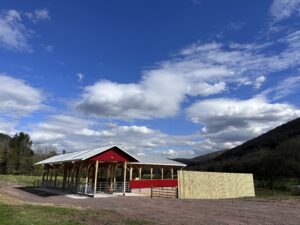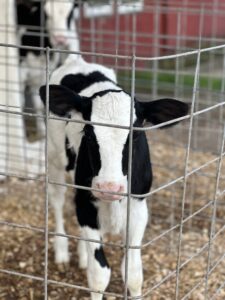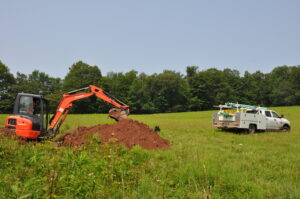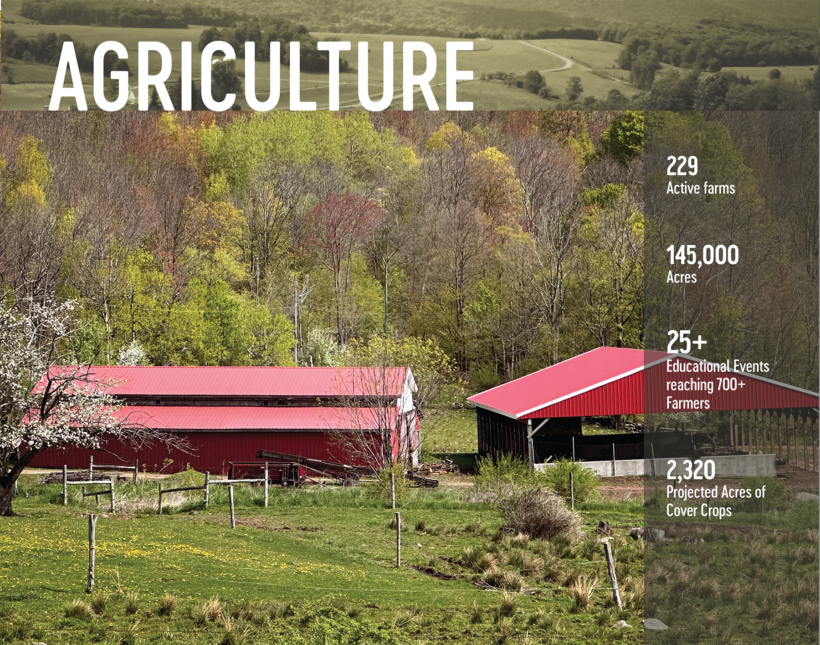The Agricultural Program made great strides this year in protecting water quality and supporting the economic viability of farms. The Watershed Agricultural Council (WAC) welcomed its new Agricultural Program Manager, Connor Young, who attributes these achievements to strong partnerships and the dedication of participating farms. The return to full implementation levels has resulted in positive momentum which the program aims to continue in 2024.
 Structural BMP Implementation:
Structural BMP Implementation:
The program implemented 85 projects, totaling 123 Best Management Practices (BMPs). These encompassed a wide range of practices including barnyards, waste storages, fences, access roads, water facilities and more. The Whole Farm Planning and Engineering teams worked closely with farmers and contractors to keep projects moving despite record rainfall. The program is anticipating increasingly variable conditions and working with partners to better understand how this might impact BMP functionality and the positive impact they have on water quality and farm operations under those scenarios.
Agronomic Practices:
The success of the program also relies on sound management strategies, and many farms have successfully adopted agronomic practices with notable results:
• Nutrient Management (NM): It was a year of technical transition for the NM Team as they adopted the NY Phosphorus Index 2.0 and CropWareNet, the newest software platform for commercial planning used by the program and statewide partners. This conversion will be fully implemented in 2024 ensuring that all 199 plans remain active and useful to producers. The NM Credit program continues to thrive with 134 record submissions for the 2022-2023 spreading season.
• Precision Feed (PF) Management: Enrollment in the PF Program grew this year with 36 dairy and 18 beef  operations currently participating. Ongoing benchmarking and Quality Management Assistance continues to show the benefits of optimizing animal health and resource efficiency through data-driven management support.
operations currently participating. Ongoing benchmarking and Quality Management Assistance continues to show the benefits of optimizing animal health and resource efficiency through data-driven management support.
• Cover Crop Adoption and Rate Increase: The program completed a comprehensive analysis of the actual costs of managing cover crops. The results indicated an average cost of $140 per acre for the 2022 growing season. The program adopted this as its new cap and will adjust annually to account for variable costs, labor and equipment costs. The current projection for 2023 is 2,319 aces on 31 farms barring any impacts from corn harvest delays (up from 18 farms and 1,315 acres in 2022). The benefits of this practice are profound in reducing erosion, preventing nutrient leaching and bolstering soil health.
Watershed Investigation and Repair Crew (WIRC): WIRC has been instrumental in promptly addressing BMP  issues that directly impact water quality and farm operations. Over the past year, 45 BMP investigations, 17 emergency and priority repairs, and six projects from the annual workload were completed. The team also provides technical assistance
issues that directly impact water quality and farm operations. Over the past year, 45 BMP investigations, 17 emergency and priority repairs, and six projects from the annual workload were completed. The team also provides technical assistance
whenever possible, supporting 30 additional projects in direct collaboration with producers.
Looking Forward:
The Agricultural Program remains committed to ongoing evaluation and innovation. We are actively assessing the long-term impact of our metrics and exploring new approaches to further enhance program impact while adapting to evolving agricultural needs and environmental challenges. Our commitment to advancing evidence-based practices and innovation ensures the long-term effectiveness of our efforts in addressing resource concerns and supporting the agricultural community within the NYC Watershed.
Read more of the 2023 Annual Report here.
Program Stats:
- 229 Active Farms
- 145,000 Acres
- 25+ Educational Events reaching 700+ Farmers
- 2,230 Projected Cover Crop Acres

